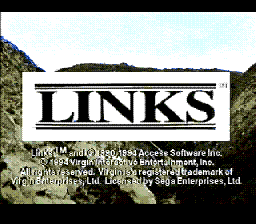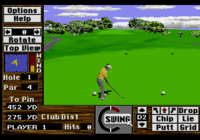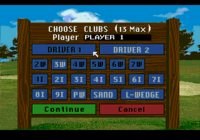Difference between revisions of "Links: The Challenge of Golf"
From Sega Retro
| (49 intermediate revisions by 12 users not shown) | |||
| Line 1: | Line 1: | ||
{{Bob | {{Bob | ||
| bobscreen=Links title.png | | bobscreen=Links title.png | ||
| − | + | | publisher=[[Virgin Interactive Entertainment]] | |
| − | + | | developer=[[Access Software]], [[Papyrus]] | |
| − | | publisher=[[Virgin Interactive]] | + | | system=[[Sega Mega-CD]] |
| − | | developer=[[Papyrus]] | ||
| − | | system=[[Sega Mega CD]] | ||
| − | |||
| sounddriver= | | sounddriver= | ||
| − | | peripherals= | + | | peripherals=[[Sega Mouse]], [[TeeVGolf]] |
| − | | players=1 | + | | players=1-6 |
| genre=Sports | | genre=Sports | ||
| − | | releases={{ | + | | subgenre=golf |
| − | | | + | | releases={{releasesMCD |
| − | | | + | | mcd_date_us=1994-09{{magref|gameplayers|0710|10}} |
| + | | mcd_code_us=T-70095 | ||
| + | | mcd_rating_us=ga | ||
}} | }} | ||
| − | | | + | | otherformats={{NonSega|Amiga|IBMPC}} |
}} | }} | ||
| − | + | '''''{{PAGENAME}}''''' is a golf game for the [[Sega Mega-CD]] released as part of the ''Links'' series. It was only released in North America, although a European release was planned{{magref|segapro|33|10}}. | |
| − | == | + | It derives from a 1990 DOS game of the same name but features a number of enhancements. It was originally developed by [[Access Software]] and can be seen as an evolution of ''[[World Class Leader Board]]'', though both games were adjusted from their source material to better suit the console market. |
| − | ===Mega CD | + | |
| + | ==Gameplay== | ||
| + | {{ScreenThumb|Links The Challenge of Golf, Gameplay.png|width=200|Gameplay}} | ||
| + | {{ScreenThumb|Links The Challenge of Golf, Clubs.png|width=200|Club selection}} | ||
| + | ''Links'' is a golf game featuring one course, the Torrey Pines South Course in San Diego, California. The goal is to hit the ball into the hole at the end of the course in the fewest strokes possible. | ||
| + | |||
| + | The game uses a cursor to navigate its menus and supports the [[Sega Mouse]]. Like many golf games, it uses a C-shaped swing meter. When the cursor has selected the swing button, the player swings by holding {{A}} or {{C}}, releasing the button to determine the power of the swing, then pressing the button again to determine the spin. The top of the meter has a mark for indicating the maximum safe power for the swing. If the player goes beyond that mark, it greatly increases the chance of a snap hook (a shot that veers off in an undesired direction). The bottom of the meter has a mark for the ideal amount of spin. Missing this mark causes the ball to slice or fade. The player can replay the shot from two different perspectives (the angle of the golfer or the angle of where the ball came to rest) or take a mulligan and redo the shot. The player is not penalized for mulligans, though the number of mulligans taken is recorded on the score card. | ||
| + | |||
| + | The game indicates the wind direction, which can affect the trajectory of the shot. Players can rotate the direction in which the golfer faces. Players can set the direction of the shot to avoid obstacles such as trees. There are chip and putt options that select the proper club automatically and change the swing. Players can also drop the ball into a new position if it is hit into an unplayable position (such as out of bounds or into a water hazard). Players can overlay a contour grid onto the course to help read the terrain or pull up a map of the course and measure distances. | ||
| + | |||
| + | Players can choose 13 clubs to carry into the game out of a selection of 20 different clubs. Woods have large heads and are used to hit the ball long distances. Drivers are woods with low loft (angle of the head) that are specifically used for hitting the ball off the tee. Irons are good for long distances, shorter than woods but more accurate. Wedges are irons with high loft that are used for chipping the ball out of hazards. Players always have a putter, which is used for hitting the ball short distances, specifically on the putting green. | ||
| + | |||
| + | The game supports up to six players taking turns on the same course and sharing the same control pad. Each player provides a name, a gender, and a skill level. Higher skill levels require more accurate timing for the swing but also have greater drive distances. The lowest difficulty is immune to the effect of wind, and the game automatically selects the best club for each situation. Players can choose to play the front nine, the back nine, or the full eighteen holes. Players can also play a tournament, which consists of three rounds of eighteen holes. The game can be saved at any point and loaded at a later time. Players can also choose a specific hole on which to practice rather than playing a full game. There is also a driving mode where players play the same hole five times and can compete with each other to get the best average yardage. | ||
| + | |||
| + | The game supports the [[TeeVGolf]] peripheral and includes a tutorial on how to use it. | ||
| + | |||
| + | ==Versions== | ||
| + | The Mega-CD version features [[full-motion video]] and a commentator, as well as a different set of graphics to better suit the Mega-CD hardware. Like the PC versions, the game lacks any sort of in-game music. Strokes are separated by noticeable load times. | ||
| + | |||
| + | Several add-on courses were released for the PC version, but the Mega-CD version only supports one course. The game has an option on the main menu for inserting a disc for a different course, but no other courses were ever released for this version of the game. | ||
| + | |||
| + | ==Production credits== | ||
| + | {{multicol| | ||
| + | {{creditstable| | ||
| + | {{creditsheader|LINKS FOR THE SEGA CD IS PUBLISHED BY VIRGIN INTERACTIVE ENTERTAINMENT, IRVINE, CALIFORNIA}} | ||
| + | *'''Vice President Product Development:''' Neil Young | ||
| + | *'''Produced and Directed by:''' Scott Duckett | ||
| + | *'''Associate Producer:''' Harvard Bonin | ||
| + | *'''Assistant Producer:''' Erik Harshman, Craig Warmsley | ||
| + | *'''Product Planning Manager:''' Randy Fujimoto | ||
| + | *'''Quality Assurance Manager:''' Dave Maxey | ||
| + | *'''Quality Assurance Team Leader:''' Bijan Shaheer, Adam Ryan | ||
| + | *'''Lead Analyst:''' Craig McCoy | ||
| + | *'''Product Analysts:''' Erik Harshman, Chris Toft, Jim Getz, Jeff Gordon, Chris Rausch | ||
| + | *'''Manual Written and Produced by:''' Mark Polcyn | ||
| + | *'''Manual Designed by:''' Mark Goodwin | ||
| + | {{creditsheader|LICENSED FROM ACCESS SOFTWARE, SALT LAKE CITY, UTAH}} | ||
| + | *'''Project Manager:''' Dave Curtin | ||
| + | {{creditsheader|DEVELOPED BY PAPYRUS DESIGN GROUP, BOSTON, MASSACHUSETTS}} | ||
| + | *'''Project Manager:''' Andy Hendrickson | ||
| + | *'''Programmers:''' Lisa Harlow-Patacchiola, Mike Newhall | ||
| + | *'''Technical Consultant:''' Dave Kaemmer | ||
| + | {{creditsheader|TEEVEEGOLF CLUB SPORTS SCIENCES, TWINSBERG. OHIO}} | ||
| + | *'''V.P. of Engineering:''' Steve Szczecinski | ||
| + | *'''VP. Marketing:''' Steve Bird | ||
| + | {{creditsheader|HELICOPTER AND GROUND PRODUCTION, TORREY PINES GOLF COURSE, SAN DIEGO. CALIFORNIA}} | ||
| + | *'''Production Manager:''' Louise Smith | ||
| + | *'''Directors:''' Chris Mortenson, Scott Duckett | ||
| + | *'''Production Assistant:''' Bob Hume | ||
| + | *'''Helicopter Pilot:''' Davey Jones | ||
| + | *'''Helicopter Camera:''' Max Penner | ||
| + | *'''Camera Assistant:''' David Nowell | ||
| + | *'''Ground Camera:''' Bob Sloan | ||
| + | {{creditsheader|HELICOPTER AND GROUND POST PRODUCTION, CBS TELEVISION CITY LOS ANGELES, CALIFORNIA & VIRGIN INTERACTIVE}} | ||
| + | *'''Production Manger:''' David Osborne | ||
| + | *'''Director:''' Scott Duckett | ||
| + | *'''Color Correction:''' Randy Freiling | ||
| + | *'''Editor and Technical Directors:''' Robert Wright, Craig Weiss | ||
| + | *'''Paintbox-Helicopter Footage:''' John Eineigl | ||
| + | *'''Paintbox-Ground Footage:''' Craig Weiss, George Garcia, Scott Duckett | ||
| + | {{creditsheader|VOICE OVER PRODUCTION AND POST PRODUCTION, SHERWOOD STUDIOS, THOUSAND OAKS, CALIFORNIA& VIRGIN INTERACTIVE}} | ||
| + | *'''Production Manager:''' Scott Duckett | ||
| + | *'''Engineer:''' Bill Cobb | ||
| + | *'''Written and Directed by:''' Scott Duckett | ||
| + | *'''Voice Over:''' Ben Wright, Steve Elkington | ||
| + | *'''Edited By:''' Robert Wright | ||
| + | | source=US manual | ||
| + | | pdf=Links mcd us manual.pdf | ||
| + | | pdfpage=24 | ||
| + | | console=MCD | ||
| + | }} | ||
| + | }} | ||
| + | |||
| + | ==Magazine articles== | ||
| + | {{mainArticle|{{PAGENAME}}/Magazine articles}} | ||
| + | |||
| + | ==Promotional material== | ||
| + | {{gallery | ||
| + | |{{galleryPrintAd | ||
| + | |gamepro|64|267 | ||
| + | |egm2|5|171 | ||
| + | |gameplayers|0710|65 | ||
| + | }} | ||
| + | |{{galleryPrintAd | ||
| + | |sv|22|75 | ||
| + | }} | ||
| + | }} | ||
| + | |||
| + | ==Physical scans== | ||
| + | {{ratings|MCD}} | ||
{{Scanbox | {{Scanbox | ||
| − | | console=Mega CD | + | | console=Mega-CD |
| region=US | | region=US | ||
| front=LtCtG MCD US Box Front.jpg | | front=LtCtG MCD US Box Front.jpg | ||
| back=LtCtG MCD US Box Back.jpg | | back=LtCtG MCD US Box Back.jpg | ||
| disc=LtCtG MCD US Disc.jpg | | disc=LtCtG MCD US Disc.jpg | ||
| + | | manual=Links mcd us manual.pdf | ||
| + | | regcard=LtCtG MCD US RegCard.pdf | ||
}} | }} | ||
| − | + | ==Technical information== | |
| − | + | {{mainArticle|{{PAGENAME}}/Technical information}} | |
| − | + | ||
| + | ==References== | ||
| + | <references/> | ||
| + | |||
| + | {{LinksOmni}} | ||
Latest revision as of 07:23, 21 September 2024
| Links: The Challenge of Golf | ||||||||||
|---|---|---|---|---|---|---|---|---|---|---|
| System(s): Sega Mega-CD | ||||||||||
| Publisher: Virgin Interactive Entertainment | ||||||||||
| Developer: Access Software, Papyrus | ||||||||||
| Peripherals supported: Sega Mouse, TeeVGolf | ||||||||||
| Genre: Sports (golf) | ||||||||||
| Number of players: 1-6 | ||||||||||
| ||||||||||
|
Links: The Challenge of Golf is a golf game for the Sega Mega-CD released as part of the Links series. It was only released in North America, although a European release was planned[2].
It derives from a 1990 DOS game of the same name but features a number of enhancements. It was originally developed by Access Software and can be seen as an evolution of World Class Leader Board, though both games were adjusted from their source material to better suit the console market.
Contents
Gameplay
Links is a golf game featuring one course, the Torrey Pines South Course in San Diego, California. The goal is to hit the ball into the hole at the end of the course in the fewest strokes possible.
The game uses a cursor to navigate its menus and supports the Sega Mouse. Like many golf games, it uses a C-shaped swing meter. When the cursor has selected the swing button, the player swings by holding ![]() or
or ![]() , releasing the button to determine the power of the swing, then pressing the button again to determine the spin. The top of the meter has a mark for indicating the maximum safe power for the swing. If the player goes beyond that mark, it greatly increases the chance of a snap hook (a shot that veers off in an undesired direction). The bottom of the meter has a mark for the ideal amount of spin. Missing this mark causes the ball to slice or fade. The player can replay the shot from two different perspectives (the angle of the golfer or the angle of where the ball came to rest) or take a mulligan and redo the shot. The player is not penalized for mulligans, though the number of mulligans taken is recorded on the score card.
, releasing the button to determine the power of the swing, then pressing the button again to determine the spin. The top of the meter has a mark for indicating the maximum safe power for the swing. If the player goes beyond that mark, it greatly increases the chance of a snap hook (a shot that veers off in an undesired direction). The bottom of the meter has a mark for the ideal amount of spin. Missing this mark causes the ball to slice or fade. The player can replay the shot from two different perspectives (the angle of the golfer or the angle of where the ball came to rest) or take a mulligan and redo the shot. The player is not penalized for mulligans, though the number of mulligans taken is recorded on the score card.
The game indicates the wind direction, which can affect the trajectory of the shot. Players can rotate the direction in which the golfer faces. Players can set the direction of the shot to avoid obstacles such as trees. There are chip and putt options that select the proper club automatically and change the swing. Players can also drop the ball into a new position if it is hit into an unplayable position (such as out of bounds or into a water hazard). Players can overlay a contour grid onto the course to help read the terrain or pull up a map of the course and measure distances.
Players can choose 13 clubs to carry into the game out of a selection of 20 different clubs. Woods have large heads and are used to hit the ball long distances. Drivers are woods with low loft (angle of the head) that are specifically used for hitting the ball off the tee. Irons are good for long distances, shorter than woods but more accurate. Wedges are irons with high loft that are used for chipping the ball out of hazards. Players always have a putter, which is used for hitting the ball short distances, specifically on the putting green.
The game supports up to six players taking turns on the same course and sharing the same control pad. Each player provides a name, a gender, and a skill level. Higher skill levels require more accurate timing for the swing but also have greater drive distances. The lowest difficulty is immune to the effect of wind, and the game automatically selects the best club for each situation. Players can choose to play the front nine, the back nine, or the full eighteen holes. Players can also play a tournament, which consists of three rounds of eighteen holes. The game can be saved at any point and loaded at a later time. Players can also choose a specific hole on which to practice rather than playing a full game. There is also a driving mode where players play the same hole five times and can compete with each other to get the best average yardage.
The game supports the TeeVGolf peripheral and includes a tutorial on how to use it.
Versions
The Mega-CD version features full-motion video and a commentator, as well as a different set of graphics to better suit the Mega-CD hardware. Like the PC versions, the game lacks any sort of in-game music. Strokes are separated by noticeable load times.
Several add-on courses were released for the PC version, but the Mega-CD version only supports one course. The game has an option on the main menu for inserting a disc for a different course, but no other courses were ever released for this version of the game.
Production credits
- Vice President Product Development: Neil Young
- Produced and Directed by: Scott Duckett
- Associate Producer: Harvard Bonin
- Assistant Producer: Erik Harshman, Craig Warmsley
- Product Planning Manager: Randy Fujimoto
- Quality Assurance Manager: Dave Maxey
- Quality Assurance Team Leader: Bijan Shaheer, Adam Ryan
- Lead Analyst: Craig McCoy
- Product Analysts: Erik Harshman, Chris Toft, Jim Getz, Jeff Gordon, Chris Rausch
- Manual Written and Produced by: Mark Polcyn
- Manual Designed by: Mark Goodwin
- Project Manager: Dave Curtin
- Project Manager: Andy Hendrickson
- Programmers: Lisa Harlow-Patacchiola, Mike Newhall
- Technical Consultant: Dave Kaemmer
- V.P. of Engineering: Steve Szczecinski
- VP. Marketing: Steve Bird
- Production Manager: Louise Smith
- Directors: Chris Mortenson, Scott Duckett
- Production Assistant: Bob Hume
- Helicopter Pilot: Davey Jones
- Helicopter Camera: Max Penner
- Camera Assistant: David Nowell
- Ground Camera: Bob Sloan
- Production Manger: David Osborne
- Director: Scott Duckett
- Color Correction: Randy Freiling
- Editor and Technical Directors: Robert Wright, Craig Weiss
- Paintbox-Helicopter Footage: John Eineigl
- Paintbox-Ground Footage: Craig Weiss, George Garcia, Scott Duckett
- Production Manager: Scott Duckett
- Engineer: Bill Cobb
- Written and Directed by: Scott Duckett
- Voice Over: Ben Wright, Steve Elkington
- Edited By: Robert Wright
Magazine articles
- Main article: Links: The Challenge of Golf/Magazine articles.
Promotional material
also published in:
- EGM² (US) #5: "November 1994" (1994-1x-xx)[4]
- Game Players (US) #0710: "Vol. 7 No. 10 October 1994" (1994-xx-xx)[5]
Physical scans
| Sega Retro Average | ||||||||||||||||||||||||||||||||||||||||||||||||||||||
|---|---|---|---|---|---|---|---|---|---|---|---|---|---|---|---|---|---|---|---|---|---|---|---|---|---|---|---|---|---|---|---|---|---|---|---|---|---|---|---|---|---|---|---|---|---|---|---|---|---|---|---|---|---|---|
|
| 66 | |
|---|---|
| Based on 10 reviews | |
Technical information
- Main article: Links: The Challenge of Golf/Technical information.
References
- ↑ Game Players, "Vol. 7 No. 10 October 1994" (US; 1994-xx-xx), page 10
- ↑ Sega Pro, "June 1994" (UK; 1994-05-24), page 10
- ↑ File:Links mcd us manual.pdf, page 24
- ↑ EGM², "November 1994" (US; 1994-1x-xx), page 171
- ↑ Game Players, "Vol. 7 No. 10 October 1994" (US; 1994-xx-xx), page 65
- ↑ Consoles +, "Mai 1995" (FR; 1995-0x-xx), page 144
- ↑ GamePro, "April 1995" (US; 1995-xx-xx), page 103
- ↑ Game Informer, "March 1995" (US; 1995-0x-xx), page 42
- ↑ MAN!AC, "04/95" (DE; 1995-03-08), page 49
- ↑ Mega Force, "Mai 1995" (FR; 1995-0x-xx), page 82
- ↑ Mean Machines Sega, "April 1995" (UK; 1995-02-28), page 83
- ↑ Player One, "Avril 1995" (FR; 1995-0x-xx), page 120
- ↑ Sega Pro, "Easter 1995" (UK; 1995-03-23), page 42
- ↑ Sega Megazone, "Summer '95/'96" (AU; 1995-xx-xx), page 32
- ↑ Top Consoles, "Mai 1995" (FR; 1995-0x-xx), page 133
| Links: The Challenge of Golf | |
|---|---|
|
Main page | Comparisons | Magazine articles | Reception | Technical information | |








